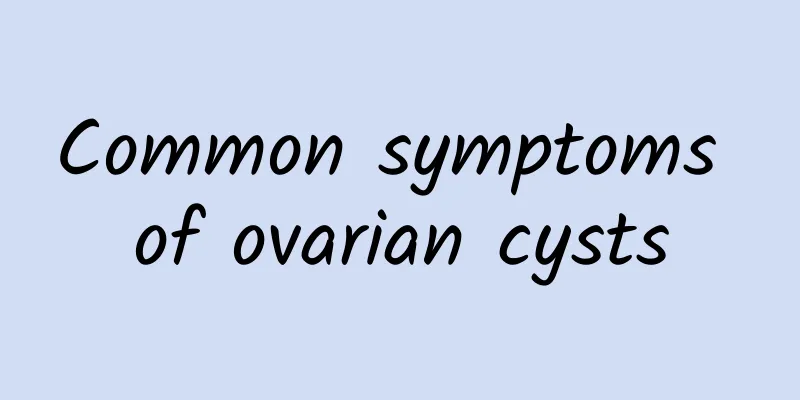Common symptoms of ovarian cysts

|
Ovarian cysts are a common gynecological disease in women with obvious symptoms, including abdominal enlargement, abdominal pain, menstrual disorders, etc. Although ovarian cysts are benign tumors, improper treatment may lead to malignant tumors. 1. Increased abdominal circumference and abdominal mass: This is the most common phenomenon in the main complaint. The patient notices that his clothes or belt seem too tight and then notices the enlargement of the abdomen, or occasionally feels uncomfortable in the morning and presses his abdomen to find a mass in the abdomen, plus abdominal distension and discomfort. 2. Discomfort in the lower abdomen: This is the initial symptom before the patient feels a lump in the lower abdomen. Due to the weight of the tumor itself, as well as the influence of intestinal peristalsis and changes in body position, the tumor moves in the pelvic cavity, pulling on its pedicle and the pelvic funnel ligament, causing the patient to feel distended and falling in the lower abdomen or iliac fossa. 3. Abdominal pain: If the tumor has no complications, there is little pain. Therefore, if patients with ovarian tumors feel abdominal pain, especially sudden onset, it is usually caused by tumor pedicle twisting, tumor rupture, bleeding or infection. In addition, malignant cysts often cause abdominal pain and leg pain, and the pain often causes patients to seek emergency treatment. 4. Menstrual changes: excessive menstrual flow, irregular menstrual cycles, prolonged menstrual duration, spotting, etc. 5. Abnormal leucorrhea: Tumors occur in the female reproductive tract, and the tumors become necrotic and ulcerated, causing watery, bloody, and rice-soup-like leucorrhea. If there is an infection, it may have a foul odor. 6. Lumps: They can grow in any part of the reproductive organs and may not cause any symptoms. 7. Changes in diet and urination and defecation: The initial symptoms may only be abdominal distension, poor appetite and gastrointestinal symptoms. Tumor compression or invasion of the bladder and rectum may cause frequent urination, difficulty urinating, dry stools, etc. 8. Postmenopausal bleeding: Vaginal bleeding may occur occasionally during the first year of menopause. |
<<: Will ovarian cysts cause ascites? In what cases will ascites occur?
>>: What are the symptoms of mild chronic cervicitis
Recommend
Do sit-ups without holding your head with your hands, right?
[Key Points]: Sit-ups are performed from lying fl...
What are the nursing methods for menopausal patients?
First of all, we need to understand the physiolog...
A brief analysis of common precautions for adnexitis
Among various gynecological diseases, adnexitis i...
Give you a good figure and slimming product lentils
Want a body like a model on the catwalk? Then you...
Experts reveal: Common causes of cervical hypertrophy
As people pay more attention to women's healt...
How can women effectively treat cervical erosion? What are the most effective treatments for cervical erosion?
Cervical erosion is a common disease among women....
Not paying attention to personal hygiene is the cause of vaginitis
At present, the incidence of vaginitis in our cou...
How to choose medication after artificial abortion
How to choose medication after artificial abortio...
How to treat upper cervical adhesions
Treatments for upper cervical adhesions include m...
How much does it cost to cure Bartholinitis?
How much does it cost to recover from Bartholinit...
How to effectively prevent cervical warts
Cervical warts are caused by human papillomavirus...
What are the early symptoms of ovarian cysts and how do they affect pregnancy?
What are the early symptoms of ovarian cysts? Wha...
What should I do if I have stomach pain after abortion?
What should I do if I have stomach pain after abo...
Create the perfect butt! Two exercises a day will bring you closer to a beautiful buttocks
It’s not difficult to get a perfect butt shape! T...
How long can a person with congenital bartholinitis live?
The main cause of Bartholinitis comes from sexual...









